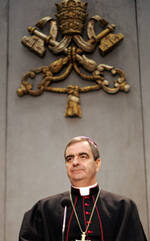It is one of the most vivid and reassuring images in the Scriptures: the Word of God compared to the rain and snow that give life to the earth:
For as the rain and the snow come down from heaven,
and return not thither but water the earth,
making it bring forth and sprout,
giving seed to the sower and bread to the eater,
so shall my word be that goes forth from my mouth;
it shall not return to me empty,
but it shall accomplish what I purpose,
and prosper in the thing for which I sent it.
Is 55:10-11
The recently concluded Synod of Bishops on the Word of God, itself a fruit of that life-giving power, took as one of the themes of its concluding message, published on Oct. 24, the efficacy of the Word of God. “The effective, creative and salvific divine word,” it wrote, “is [the] source of being, of history, of creation and redemption.”
The Word, the synod writes, “walks along the roads of the world to encounter the great pilgrimage that the people of earth have taken up in search of truth, justice and peace.” The Word who “goes forth into the streets of the world also discovers the slums where suffering and poverty, humiliation and oppression, marginalization and misery, physical and psychological ills and loneliness can be found.” The Word is present to those dying and suffering in war, to those oppressed by injustice and crushed by the powerful. The Word gives strength to those persecuted “because of faithfulness to their conscience and fidelity to their faith.” And in these troubled times, the Word of God finds expression in the “two-edged sword”of prophecy.
The Word of God is active, slaking the thirst for the Spirit in souls quietly suffering in despair. “Even in the modern secularized city, in its squares and in its streets—where disbelief and indifference seem to reign, where evil seems to prevail over good, creating the impression of a victory of Babylon over Jerusalem—one can find a hidden yearning, a germinating hope, a quiver of expectation.” Even where “many feel the silence of God, his apparent absence and indifference, hanging over them: ‘How long, Lord, will you forget me? Forever? How long will you turn away your face from me?’ (Ps 13:1),” the synod writes, God promises the divine Word will give life.
The Word of God is found in Scripture and tradition, but pre-eminently in Jesus Christ, the Word incarnate. The synod invites its hearers to contemplate the face of Christ, and the Christ it presents to us is accessible, acquainted with sorrow and “and in every way made like man.” “He repeatedly places his hands on ill and diseased flesh. His words proclaim justice, instill courage to the disheartened and offer forgiveness to sinners.” In his image, his disciples “have the mission to announce [the] divine word of hope...through the loving closeness that neither judges nor condemns, but that sustains, illuminates, comforts and forgives....”
The synod urges the church to come to know Christ by studying the Scriptures more assiduously and embracing them in their way of life. “Every reader of scripture, even the most simple,” the synod says, “must have [an appropriate] knowledge of the text.” One topic of debate around the synod was the relative weight that exegesis and theology should have in interpretation of the text. The Incarnation, the message tells us, is the key to reading the Bible. Without reference to the Word-made-flesh, it warns, we are at risk of becoming fundamentalists. But as we read Scripture, the synod endorses both exegesis and theology. Exegesis provides historical and literary methods for understanding the human expression of the Bible. The theology present in the church’s tradition provides “the transcendent dimension of the divine word.” In the harmony of exegesis and theology, the message concludes, “the face of Christ will shine forth in fullness....”
The synod has many proposals to help make the Word more effective in the lives of the faithful today, including family Bible reading, the popular use of the divine office and lectio divina, a prayerful way of reading Scripture. Recognizing that the homily is for most Catholics “the central moment of encounter with the word of God,” the synod urges prophetic preaching in which the homilist not only proclaims the Word with authority but also makes “the question of conversion and vital commitment blossom in [the listeners’] hearts. ‘What are we to do, brothers?’ (Acts 2:37).” “Authentic hearing,” the message declares, “is obeying and acting.” Hearers of the word, we must put it into practice. Viva lectio, vita bonorum, it recalls: “The living Gospel is the life of good men and women.” In them the Word of God continues to be revealed to the world.








